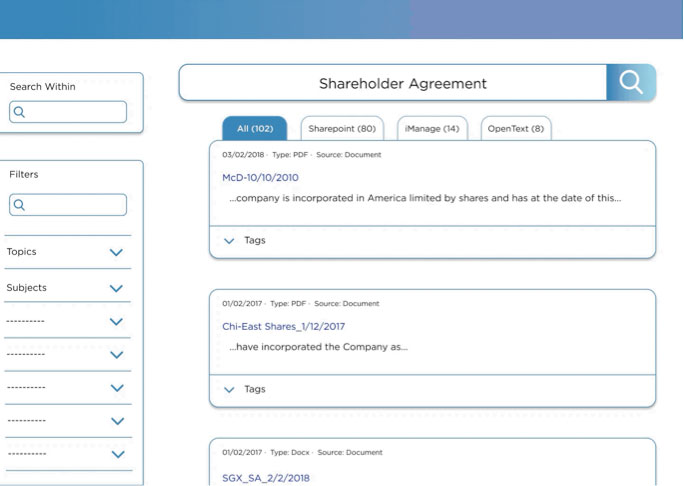
Three Ways Engaging AI Can Streamline Your Legal Practice
Rising Complexities and Opportunity Costs
Every year globally, millions of documents pass through the hands of lawyers to build cases for their clients and this only grows over time. According to the Future Ready Lawyer’s Survey which interviewed 700 lawyers across the US and Europe, seven out of 10 lawyers struggle with the increasing volume and complexity of document processing and want to focus on efficiency and productivity in document management and processing. The time taken back and forth in searching, asking and validating information versus spending time with their clients or building the case translates to high running costs and reduced transaction rates as a business over time.
The Rise of Legal Tech in Streamlining Legal Practices
Today, artificial intelligence is reducing the mechanical and repetitive rigor in the business of law globally. It’s no surprise over the last year, legal tech has seen a 713 per cent increase in investment according to Forbes. Here are three benefits of applying AI to streamline their legal business.
1. Expedite decision making process through a legally-trained search engine sifting across various knowledge bases
Documents sit across domains, in e-mails, sharepoints and data servers. Whether performing research for a litigation case, or locating the right precedent for a corporate matter, hunting for the right set of documents is a time-consuming exercise. Through integrating different knowledge bases, automatically tagging documents and providing a user-friendly search interface, natural language understanding artificial intelligence can do the heavy lifting and hone in on the right set of documents. Useful views like domain filters, document relationship maps and owners’ contacts also provide lawyers with proper context and expedite the decision making process.

An intelligent search engine that has the cognitive abilities to extract information accurately and present its relationship with other documents and entities has the potential to quicken the research process in building a case
2. Integrating with an AI powered paralegal to extract and process documents accurately
Processing documents like receipts, contracts or discovery work is highly labour and cost intensive because of the technical complexity of practising law as well as the various different document types involved. Without artificial intelligence, these processes require highly skilled legal staff to read, understand and validate the documents. Training artificial intelligence to identify, extract and validate the right documents and information at speed would dramatically reduce the manpower time cost, allowing lawyers to have more time with clients and build their cases.

An Artificial Intelligence powered solution can accurately scan and understand both the context and content of complex documents to verify if contracts or receipts are correctly filled in and valid
3. Access information seamlessly 24/7 through a law-smart virtual assistant
Today’s knowledge driven companies like banks and hotels use chatbots on a daily basis to serve their customers and virtual assistants are smarter than ever before. They provide not only information but recommendations on a course of action based on understanding the conversation it just had. With knowledge stored in the cloud and accessed through a virtual assistant trained to identify and understand legal terms and concepts, lawyers can participate in a multi-chat via a “Lawbot” to access information and collaborate anytime, anywhere in the world, creating organisational scalability especially critical for global law firms. A virtual assistant can also interact with clients, answering common general legal queries that do not involve a specific factual matrix.
Reduced Repetitive Processes = Increased Productivity
Today, accessing and processing legal documents and information need not be time and cost intensive. The mechanical and repetitive rigor can be reduced significantly through integrating artificial intelligence. Whether it is automating the search, extraction or conversation process, integrating artificial intelligence in these workflows is the key to a more productive legal practice.






